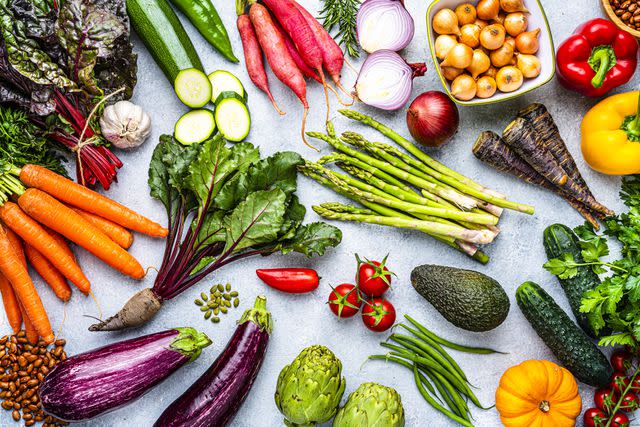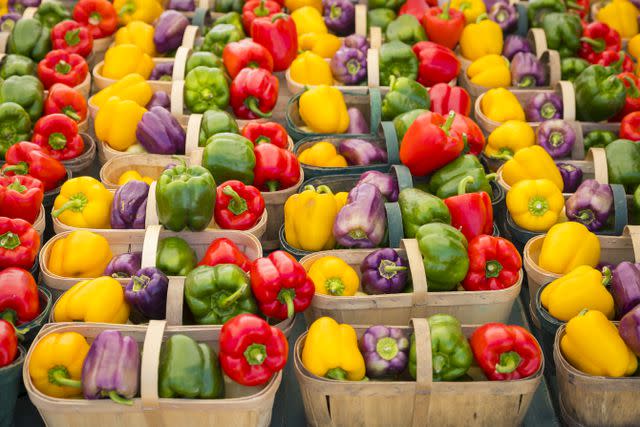What Vegetables Are In Season Right Now?
Know when to buy your favorite veggies.
If you head to the supermarket or farmer’s market in the last few weeks of summer, you’ll likely see plenty of fresh corn and green beans, but come fall it’s all about broccoli, rutabagas, and sweet potatoes. That’s because different vegetables are in season during different times of the year. In-season vegetables tend to be fresher and tastier than those that aren’t in season, and if you’re trying to reduce your carbon footprint, buying in-season produce is the way to go.
To help you know what vegetables are in season when, we’ve broken it down by season and used the U.S. Department of Agriculture as a guide. As you'll notice, many veggies have seasons that span several months, like bell peppers, and some are even in-season all year round. On the other hand, others, such as rhubarb, have seasons that are (frustratingly!) much shorter.

fcafotodigital/Getty Images
When Are Vegetables Considered In-Season?
Generally speaking, vegetables that are in season refer to those that are purchased and consumed around the time that they are harvested—when they are freshest, and typically tastiest. However, seasonal produce will vary by growing conditions and weather. It also largely depends on where in the country you live. In other words, while Californians can snag freshly harvested asparagus (grown in-state) January through May, and again in the fall, those of us in the Northeast are really only treated to the stalky veggie in the warmer months.
Related:15 Easy Vegetable Side Dishes That Go With Everything
And while you may have noticed that you can purchase certain vegetables year-round despite a limited season, that’s likely because that produce is being harvested in other states or countries where it is in-season, and then shipped to where you live.

carlosgaw/Getty Images
What Vegetables Are in Season in Winter?
Winter is the season for root vegetables, which grow underground and absorb nutrients from the soil. This means they are some of the healthiest and heartiest veggies you can find, such as beets, cabbage, and rutabagas. You’ll also find plenty of cruciferous vegetables, tubers, and alliums.
(By the way, avocados, butternut squash, and a handful of other foods botanically classified as fruits are also in season in winter.)
Beets
Brussels sprouts
Cabbage
Carrots
Celery
Collard greens
Herbs
Kale
Leeks
Onions
Parsnips
Potatoes
Rutabagas
Sweet potatoes and yams
Swiss chard
Turnips

AnastasiaNurullina/Getty Images
What Vegetables Are in Season in Spring?
Spring vegetables tend to be lighter and colorful, and many have an irresistible crunch. You’ll still find a fair amount of root veggies, but it’s also the season for leafy greens, meaty mushrooms, and zingy radishes.
(And FYI, while you might think peas are a vegetable, they are technically classified as a fruit, but spring is when they are at their peak.)
Asparagus
Broccoli
Cabbage
Carrots
Celery
Collard greens
Garlic
Herbs
Kale
Lettuce
Mushrooms
Onions
Radishes
Rhubarb
Spinach
Swiss chard
Turnips
Related:15 Vegetable Soup Recipes to Make Tonight

Ashley L Duffus/Getty Images
What Vegetables Are in Season in Summer?
Summer is a time when fresh vegetables (and fruits!) really shine. Head to the farmer’s market and stock up on fresh corn, green beans, okra, and more. (Cucumbers, lima beans, summer squash, and tomatoes are great summer seasonal fruits.)
Beets
Bell peppers
Carrots
Celery
Corn (some say that corn is botanically considered a fruit, but the USDA classifies it as a vegetable)
Garlic
Green beans
Herbs
Okra

Sarsmis/Getty Images
What Vegetables Are in Season in Fall?
As the temperatures begin to dip, the vegetables get a bit heartier. Cruciferous veggies such as broccoli and cauliflower are back, as are root vegetables like radishes and rutabagas. And even though pumpkin is a ridiculously popular seasonal fall ingredient, the orange gourd is technically classified as a fruit, because it grows from a flower. The same is true for other squash varieties like kabocha and acorn squash.
Related:The 30 Healthiest Foods to Eat Every Day
Beets
Bell peppers
Broccoli
Brussels sprouts
Cabbage
Carrots
Cauliflower
Celery
Collard greens
Garlic
Ginger
Green beans
Herbs
Kale
Lettuce
Mushrooms
Onions
Parsnips
Potatoes
Radishes
Rutabagas
Spinach
Sweet potatoes and yams
Swiss chard
Turnips
For more Real Simple news, make sure to sign up for our newsletter!
Read the original article on Real Simple.

